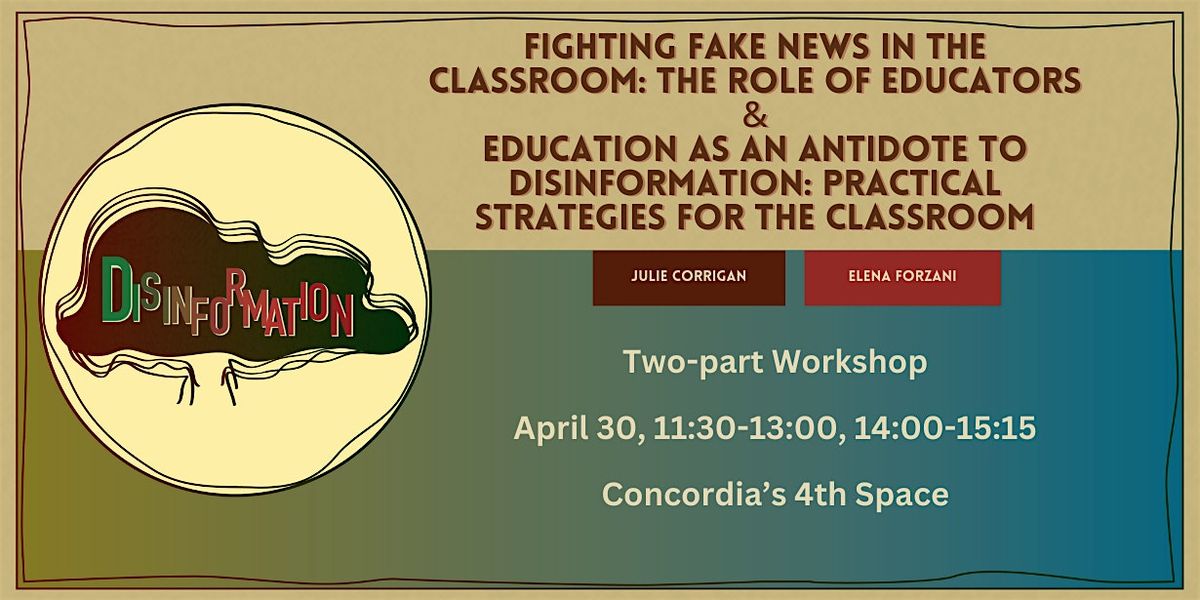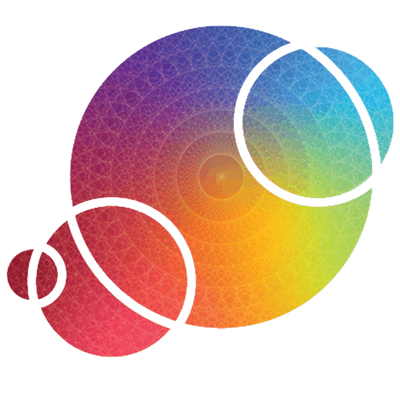Disinformation Conference: 2-Part Workshop
Schedule
Tue Apr 30 2024 at 11:30 am to 03:30 pm
Location
4TH SPACE, Concordia University | Montreal, QC

About this Event
Our research has documented the ways in which students—in Quebec and around the world—struggle to evaluate the credibility of online information, often relying on superficial features of an online source rather than its actual content or the credibility of the author. This leaves students vulnerable to dis/misinformation, particularly as they navigate polarizing social, political, and scientific online information. In speaking to Quebec secondary teachers, we learned that teachers feel unprepared to address disinformation, and when they do, they use ad hoc approaches that they feel are insufficient. Furthermore, teachers told us that teaching the digital and cross-curricular competencies (prescribed by the Quebec Education Program related to online information) are simultaneously every teacher’s responsibility and no teacher’s responsibility. These challenges leave a particular void in the classroom when it comes to addressing disinformation.
Therefore, in this two-part interactive workshop, we will invite participants to engage in an online inquiry task and discuss a range of pedagogical strategies for supporting students to approach online information. We will then—in small and whole group discussions—debrief this task and discuss the tensions and possibilities of navigating our responses to mis/disinformation in the classroom. Next, we will present the Critical Online Resource Evaluation (CORE) framework, an evidence-based approach that we used to design classroom resources with and for Quebec teachers. The second part of the workshop will focus on practical strategies and habits of mind that teachers can use to support their students in taking a critical approach to online evaluation. Finally, we will share free resources that are applicable to a wide-range of classroom contexts and are aligned with the Quebec Education Program.
Workshop notes:
Participants are encouraged to bring a digital device—such as a tablet, laptop, or even a cellphone—to this interactive workshop.
Note that this is a two-part workshop, although it is possible to attend only one of the two workshops. : A 1 hour lunch break will split up the two workshops.
----------------
Nos recherches ont permis de documenter la façon dont les étudiants - au Québec et dans le monde entier - luttent pour évaluer la crédibilité de l'information en ligne, se fiant souvent aux caractéristiques superficielles d'une source en ligne plutôt qu'à son contenu réel ou à la crédibilité de l'auteur. Les élèves sont donc vulnérables à la désinformation, en particulier lorsqu'ils naviguent dans des informations sociales, politiques et scientifiques polarisées en ligne. En discutant avec des enseignants québécois du secondaire, nous avons appris qu'ils ne se sentent pas préparés à aborder la question de la désinformation et que, lorsqu'ils le font, ils utilisent des approches ad hoc qu'ils jugent insuffisantes. De plus, les enseignants nous ont dit que l'enseignement des compétences numériques et transversales (prescrites par le Programme de formation de l'école québécoise en matière d'information en ligne) est à la fois la responsabilité de chaque enseignant et la responsabilité d'aucun enseignant. Ces défis laissent un vide particulier dans les classes lorsqu'il s'agit d'aborder la désinformation.
Par conséquent, dans cet atelier interactif en deux parties, nous inviterons les participants à s'engager dans une tâche d'enquête en ligne et à discuter d'une série de stratégies pédagogiques pour aider les étudiants à aborder l'information en ligne. Ensuite, dans le cadre de discussions en petits groupes et en groupes entiers, nous ferons un compte rendu de cette tâche et discuterons des tensions et des possibilités de naviguer dans nos réponses à la désinformation dans la salle de classe. Ensuite, nous présenterons le cadre d'évaluation critique des ressources en ligne (CORE), une approche fondée sur des données probantes que nous avons utilisée pour concevoir des ressources pédagogiques avec et pour les enseignants du Québec. La deuxième partie de l'atelier se concentrera sur les stratégies pratiques et les habitudes d'esprit que les enseignants peuvent utiliser pour aider leurs élèves à adopter une approche critique de l'évaluation en ligne. Enfin, nous partagerons des ressources gratuites qui s'appliquent à un large éventail de contextes scolaires et qui sont conformes au Programme d'éducation du Québec.
Notes sur l'atelier :
Les participants sont encouragés à apporter un appareil numérique - tel qu'une tablette, un ordinateur portable ou même un téléphone portable - à cet atelier interactif.
Il s'agit d'un atelier en deux parties, mais il est possible de n'assister qu'à un seul des deux ateliers : une pause déjeuner d'une heure séparera les deux ateliers.
Where is it happening?
4TH SPACE, Concordia University, 1400 Maisonneuve Boulevard West, Montreal, CanadaEvent Location & Nearby Stays:
CAD 0.00
